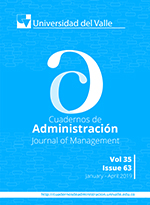Effect of trading on the profitability and solvency of colombian banks
Main Article Content
The banking models adopted by colombian banking, based on concepts applied in economies of developed countries, have enabled credit institutions to offer their clients new and more sophisticated services due to the multi-banking scheme. However, some authors have suggested that it is possible that the increasing participation of banks in trading operations, due to their income diversification strategy, may be detrimental to financial intermediation activities and is exposing them to risks in both profitability and solvency. Through the panel data methodology, this research seeks to study the effect of income diversification on colombian commercial banks’ profitability and financial solvency, between 2005 and 2014. The results show that the diversification of income through trading has no effect on the solvency and profitability of banks.

